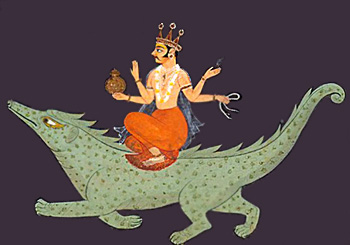 Disintegration of Vedism can be attributed to the malpractices in religion, new concepts due to the Aryan insurgence, birth of philosophy and popularity of Buddhism. Vedism is also known as Vedic religion.
Disintegration of Vedism can be attributed to the malpractices in religion, new concepts due to the Aryan insurgence, birth of philosophy and popularity of Buddhism. Vedism is also known as Vedic religion.
Corruption in Religion
It has been equally opined by many historians religion in its formative period was free from many blemishes that upset people in its later stages. In most of the ancient hymns which are addressed to Lord Varuna, the conception of the Supreme is more sublime and God-like than they are in successive hymns which are addressed to later deities. This is considered as a natural human tendency which has its effects on the religious history of mankind.
Coming of Aryans
The exodus of the Aryans took place about 1500 B.C. They had encountered strange people who were different in colour, in language, in religion and in custom. The Aryans had dominated the aboriginal inhabitants of the north that included inhabitants from Indus to the Ganga and from the Himalayas to the Vindhya Mountains. Aryans and aborigines gradually combined into one community. The Aryans had composed the upper and the aborigines had composed the lower classes. Under Rama`s leadership the Aryans turned towards the south and did attempt to conquer the aboriginal races there. However their attempt went in vain. They failed to impose their language on them. However they were able to conquer the inhabitants of the south through the weapons of learning and higher civilization.
It has been observed that ethnologically the aboriginal races of India are Turanian in contrast to the Aryans. They are known as Gauda-Dravidian, Gauda indicates the northern and Dravidian the southern aboriginals. Philologically they were divided into Tibeto-Burman, Kolarian and Dravidian. The Aryans had worshipped the elements and activities of nature. The aboriginals followed the religion of Fetichism and Animalism. Fetichism adored the objects of nature like heaven and the earth, the sun, the fire and so on. In Animalism the worship revolved around animals. Stones, trees, serpents, monkeys, vultures, fish were among the worshipped.
 Sanskrit which is the language of the ancient Aryans declined under the operation of the general laws to which all languages are subjected to. Through the contact with the languages of the aboriginal tribes the language of Prakrit was born, which has become the vernaculars now spoken in north and west India.
Sanskrit which is the language of the ancient Aryans declined under the operation of the general laws to which all languages are subjected to. Through the contact with the languages of the aboriginal tribes the language of Prakrit was born, which has become the vernaculars now spoken in north and west India.
Development of Philosophy
Study of philosophy began in India at a very early age. Few hymns in Atharva and the Rig Veda are of a speculative character and indicate a long period of deep reflection on the origin and nature of things. The Upanishads are more than inquisitive metaphysical disquisitions on God, Man and the Universe. The study of philosophy has been constantly pursued.
The six systems of orthodox philosophy are - the Nyaya; the Vaiseshika; the Samkhya, the Yoga; the Mimamsa and the Vedanta. The Nyaya and Vaiseshika are similar doctrines. Nyaya was chiefly occupied with the principles of investigating truth, and Vaiseshika was concerned with the objects to be investigated. The Samkhya is followed by the Yoga. The Mimamsa describes the ceremonial observances through which religious value may be acquired. The Vedanta expounds the Upanishads and develops the higher mode of meditation on the nature and attributes of the supreme Brahma.
Rise of Buddhism
The religion of Buddhism emerged from the Philosophical Systems as they emerged from the Upanishads. Buddhism was a major threat to Vedism.
The doctrines of Buddhism probably have been developed from the Hindu systems. The charm of Buddhism lies in the personality of its founder. It was his personality that influenced mankind at first. The Buddhist literature has a person for its centre; and the monuments like stupas, dagobas and chaityas have been raised to honor his relics. The fundamental doctrines of his system- God does not exist, Vedas have no power, Priests, prayers and sacrifices are of no use, Caste is an invention and everybody can attain irrespective of sex, caste and country. He had also advocated the Noble eight fold path which can lead one to attain Nirvana.




















